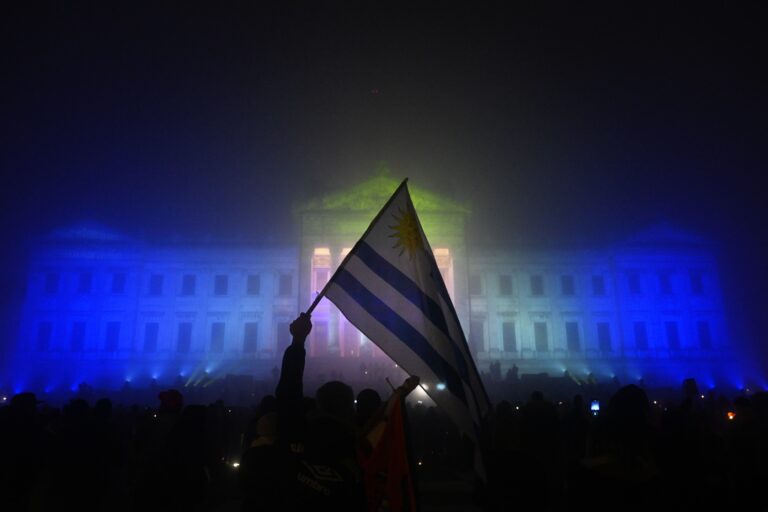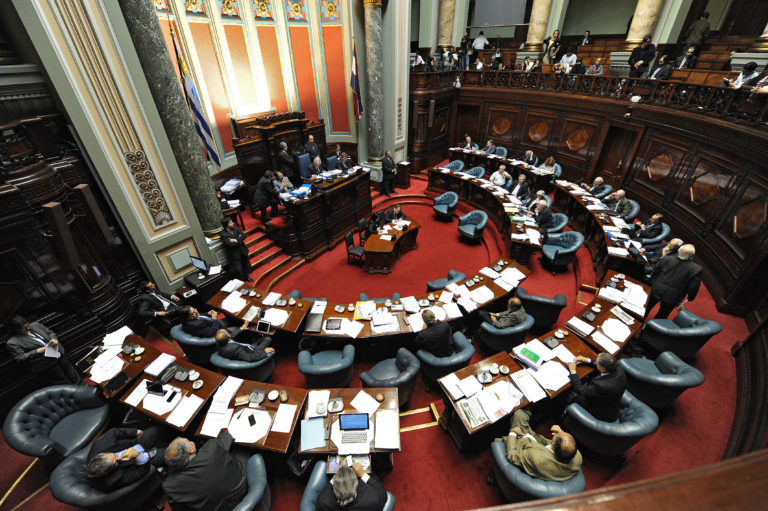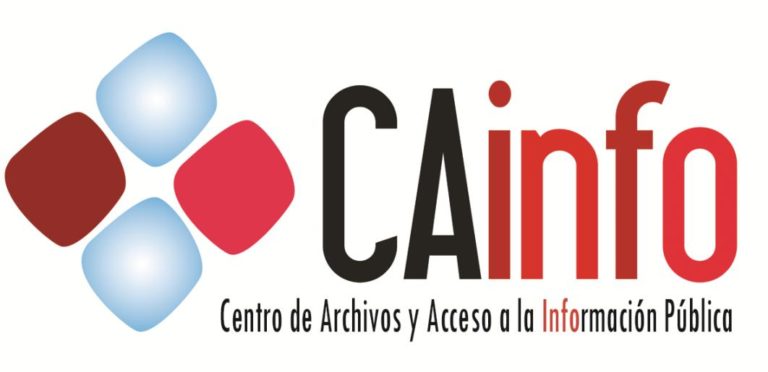Source: Radio Panamericana CX 44 *** Update to IFEX CH advisories of 30 & 31 August and 2 September *** Radio Panamericana CX 44, the most important opposition radio station in Uruguay that was closed by presidential decree on 26 August, 1994, is still off the air. At the moment, the radio station is awaiting […]
Source: Radio Panamericana CX 44
*** Update to IFEX CH advisories of 30 & 31 August
and 2 September ***
Radio Panamericana CX 44, the most important opposition radio station in Uruguay that was closed by presidential decree on 26 August, 1994, is still off the air. At the moment, the radio station is awaiting the Supreme Court’s ruling.
Officially, CX 44 was closed because of an administrative error” when it changed owners back in 1988. The government was aware of this “error” but it did not take action until last August.
The closure came amid peaceful demonstrations that were violently dissolved by anti-riot police. One person was killed and many wounded. Panamericana was critical of the police action and asked for the resignation of the Minister of Interior.
Journalists believe that the broadcasts of the station were the real reason for the closure. On November 27, 1994, Uruguay had general elections and a new
President (Julio Maria Sanguinetti) and Vice-president (Hugo Batalla) were then elected. The new government will take power on March 1, 1995.
During their campaign, both Sanguinetti and Batalla gave speeches with strong democratic character. Batalla worked as journalist for the banned “Radio Panamericana CX 44”.
BACKGROUND INFORMATION:
(From an article, “URUGUAY: CASSETTES INSTEAD OF RADIO WAVES”, by Amaia Esparza published in the Dutch magazine “De Journalist” on November 18, 1994).
“Radio Panamericana CX 44”, the most important opposition radio station in Uruguay, was banned from broadcasting as a result of an order signed on August 26, 1994 by President Alberto Lacalle and Defence Minister Daniel Hugo Martin. The 73 journalists of
Panamericana have taped the programmes on cassette since then.
These are later distributed among the people. “It’s an
alternative way of broadcasting,” says Orlando Munoz, journalist of “Radio Panamericana.” According to Munoz, the distribution of the taped-programmes is not in conflict with the closure order as, officially, this was not prompted by Panamericana’s broadcasting but rather by an “administrative error” that took place in 1988.
Munoz has been in Europe for one-and-a-half months
to meet governments and colleagues and get support for his closed radio station. “Our lawyers have described the closure order as a `misuse of power,'” continues Munoz, “because its real aim is hidden.”
Uruguay, as many other South American countries, had a “soft” transition from dictatorship to democracy, following negotiations between the opposition and the military. One of the consequences of these agreements is the fact that the media is
under control of the Ministry of Defence. “There is no Ministry of Information in Uruguay and the Press Law is very vague.
Everything is organised by Defence,” says Munoz.
The sudden closure of a radio station is always upsetting, specially when the measure is taken at the threshold of general elections. Uruguay goes on November 27 to the ballot box. For the very first time since the country’s independence in 1830 (except
for dictatorship periods, the last one between 1973 until 1984) the Uruguayan biparty system of the White Party and the Red Party could be broken.
“Radio Panamericana CX 44” was run until 1988 by
the firm Panamericana S.R.L. The society Tupac Amaru S.R.L. (former guerrilla Movement for the National Liberation which have nothing to do with the Peruvian namesake guerrilla movement) began renting some broadcasting hours of Panamericana to bring its message to the people.
Finally, on June 18, 1988 following some negotiations, Tupac Amaru rented the whole broadcasting time of the radio station. This way the “People’s Radio Station” was founded. But it would always be known as Panamericana. “The administrative error’ took place in this negotiations.
The government knew about the `error’. Even more, the director of Telecommunications talked in 1993 about a `regulation of the situation’,” says Munoz. “The sudden closure of the radio station based on that argument made no sense at all.”
Radio Panamericana became the voice of the opposition movement Frente Amplio (Wide Front), a left-wing coalition which grew as an alternative political power. All sectors of the society were
allowed to express their ideas in Panamericana and the station quickly climb to the top of the list of most listened broadcasters.
The Wide Front became the first political power in the capital Montevideo and, in the upcoming elections, it
threatened the biparty system. “That’s why Radio Panamericana had to be silence,” declares Munoz.
The opportunity came on August 22, 1994 when three illegal Basques, accused of involvement with the Basque pro-independence armed movement ETA, were to be deported following the request by the Spanish government.
This measure provoked a pacific demonstration that was violently dissolved by the anti-riot police. “Radio Panamericana was there, I was there,” continues
Munoz. “We broadcasted everything live, the incomprehensible use of violence by the police, the 24-year man shot dead, the tens of wounded people, everything.”
Radio Panamericana covered the incident on the spot and continued with it the next day from the
studio. Munoz: “Our broadcast was critical of the police action and the responsibility of the government. Panamericana urged the resignation of the Home Office Minister and demanded an
investigation by the Ministry of Justice to determine who was responsible for the death and the wounded people.”
On August 26, Panamericana and “Radio Centenario”, another opposition radio station, received an order from the Ministry of Defence to go off the air for 48 hours. The decision was based on the violation of some law articles dating from the dictatorship.
However, that same day, president Lacalle and Minister of Defence Martin signed an order to close Panamericana due to an `administrative error.’ “If that was so,” adds Munoz, “the government should give some time to Panamericana to correct the
error. But now we are talking about the restriction of freedom of expression.”
The appeal by Panamericana’s defence lawyers was rejected. “The government gave no other choice but to reject it. It may sound ironic, but two days before the court’s ruling, the government placed an advertisement in the newspaper offering Panamericana’s frequency to rent. That was a very clear signal for the judge,” alleges Munoz. In the meantime, the journalists tape the programmes on cassettes and distribute them among the people.
“Panamericana has a lot of friends. The recorded programmes are listened in the neighbourhoods during festivals and street events,” tells Munoz.
Panamericana still pays the salaries of its staff “because we hope that after the elections, a new government will come and will reverse the closure order,” says Munoz. If that does not happen 73 journalists will lose their jobs. “But that’s not the worst,” answers Munoz. “Democracy in Uruguay must
consolidate yet. It’s necessary that the freedom of expression is respected. An alternative radio station such as Panamericana can shape the public opinion and strengthen democracy. The government has revived the ghost of the dictatorship and the Uruguayan opposition has lost its voice.”
Recommended Action
-Send faxes to both Sanguinetti and Batalla to express concern about the undemocratic action taken against “Radio Panamericana CX 44” by the government of the outgoing President Lacalle.
Reminding that both Sanguinetti and Batalla defended the democratic character of the new government that will take power on March 1.
Asking them for a quick intervention into the Panamericana’s situation in order to bring the station back on the air. This would show their compromise with democracy and freedom of expression.
Pointing at the fact that the media in Uruguay is still under the control of the Ministry of Defense and that the Press Law is very vague. Suggest that this situation should be revised in order to strengthen the freedom of the press and expression in Uruguay.
Appeals To
Julio Maria Sanguinetti (Uruguay’s new president from March 1)
Hugo Batalla (Uruguay’s new vice-president from March 1)
Fax: +598.2.299 632
COPIES TO:
Radio Panamericana CX 44
Att. Orlando Munoz
Fax: +598.2.499 957
Comcosur
Att. Carlos Casares
Fax: +598.2.901 136
e-mail: COMCOSUR@CHASQUE.APC.ORG


